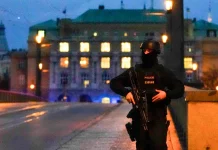A deal to free 50 women and children held by Hamas and to suspend hostilities for four days has finally brought some good news after nearly seven weeks of brutal war between Israel and the Islamist group. The release of about 240 hostages, many of them civilians, is a long-awaited relief for Israelis who have suffered from the trauma of the October 7 attack by Palestinian militants that sparked the conflict.
The agreement also requires Israel to stop its land and air attacks on Gaza to allow the safe exit of the hostages and the entry of vital aid to the besieged territory. This could ease the plight of the 2.3mn Palestinians who have been living under Israel’s relentless bombardment. They urgently need food, water, medicine and fuel, as Israel has barely let any aid into Gaza since it started its war on Hamas.
This diplomatic breakthrough should not be squandered. Israel and Hamas must work to extend the deal to free the remaining hostages and alleviate the suffering of Gazans, more than half of whom have lost their homes. The deal should pave the way for a humanitarian ceasefire. The disaster in Gaza must end and more aid must be delivered. Israel should seize the opportunity to reassess its goals and tone down its extreme rhetoric.
Israel’s wish to destroy Hamas, which has ruled Gaza since 2007, is understandable after the group’s fighters launched the most lethal attack ever on Israeli territory, killing about 1,200 people, according to Israeli officials. But the cost for Gaza has been horrific, with nearly 13,000 people dead, Palestinian officials say. Israel clearly has no clear political vision to go along with its fierce offensive.
Even if Hamas’s military strength and leadership are severely damaged, the group, or other militants with a different name, will keep on fighting and mobilising. Its ideology will not be wiped out by bombs. Israel has already achieved some success in weakening Hamas. A more realistic aim of its operation would be to ensure the group cannot pose a threat, rather than wiping it out completely – which would mean turning Gaza into rubble.
The bloodshed in the territory risks creating the next generation of militants in the Palestinian lands, jeopardising the very security goals Israel wants to accomplish, and eroding its support around the world. The longer the offensive goes on with no clear end in sight, the more it will look like revenge, rather than strategy.
There seems to be no serious debate in Israel about who will take charge, even if Hamas, which has governed the territory for 16 years, is ousted – or who will provide services, internal security, aid and urgent rebuilding. Washington has proposed that the Palestinian Authority, the weak entity that runs parts of the occupied West Bank, should take over the territory. That may make sense in theory but is likely to be impractical in reality.
Israel appears to be hoping that it can pass on the responsibility for what happens next to the US and Arab states, amid talk of some kind of international administration or peacekeeping force in Gaza. But no external actor will want to be seen as entering the ruins of Gaza on the back of Israeli tanks, taking charge of a devastated population, and facing a rebellion.
Until the bombing of Gaza stops, it is impossible to know what reality will emerge in the territory. Talks in western capitals about the “day after” are important, but cannot ignore what is happening today to Gaza and its people. If Israel persists on its current course, there will be nothing left but a wasteland where the seeds of the next crisis will inevitably grow.





